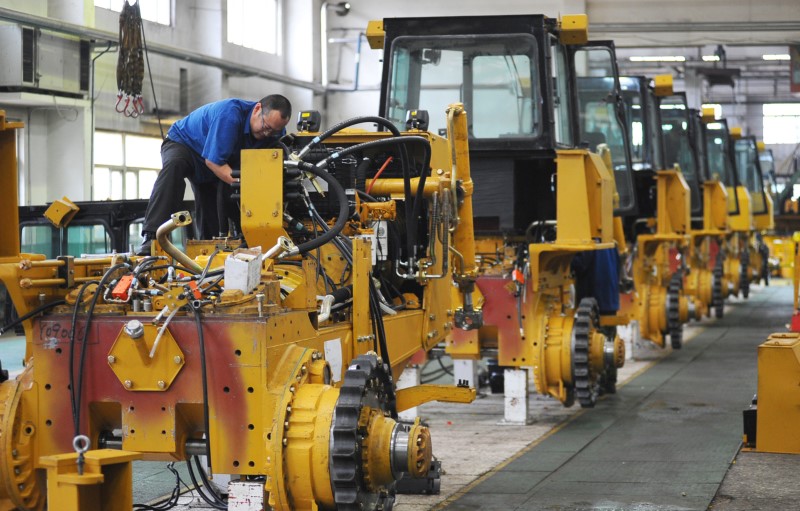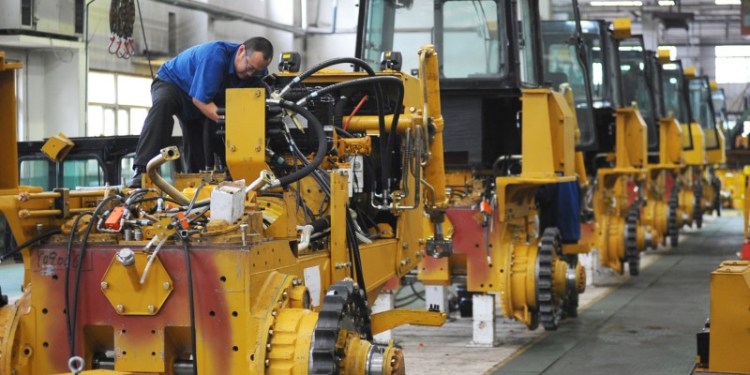 © Reuters. An employee works at an assembly line of bulldozers at a factory in Zhangjiakou
© Reuters. An employee works at an assembly line of bulldozers at a factory in ZhangjiakouBy Lusha Zhang and Sue-Lin Wong
BEIJING (Reuters) – Profits for China’s industrial powerhouses surged the most in nearly six years in September as a government crackdown on air pollution sparked fears of winter supply shortages and sent prices of finished goods like steel and sharply higher.
Sustained earnings growth will give China’s policymakers more room to restructure bloated and often inefficient state-owned enterprises, which dominate the industrial landscape and account for a hefty portion of the country’s corporate debt.
Industrial profits in September rose 27.7 percent from a year earlier to 662.18 billion yuan ($99.46 billion), accelerating from a 24 percent jump in August, the National Bureau of Statistics (NBS) said on its website on Friday.
That was the sharpest gain since December 2011, when profits grew 31.5 percent.
For the first nine months of the year, the firms notched up profits of 5.58 trillion yuan, a 22.8 percent jump from the same period last year and up a touch from 21.6 percent growth in January-August.
While a year-long construction boom is starting to show signs of fatigue, still robust industrial earnings will be good news for the country’s leaders who gathered for a critical Communist Party Congress over the past week to set political and economic priorities for the next five years.
President Xi Jinping opened the twice-a-decade gathering, stressing the need to move from high-speed to high-quality growth.
While reiterating a commitment to deepening market reforms, he also said the government would strengthen state firms, raising questions about whether the sector would see significant and likely painful reforms.
Market watchers had expected solid September earnings growth after the producer price index (PPI) rose by a sharper-than-expected 6.9 percent from a year earlier.
A year-long construction boom has helped boost prices for building materials from steel and glass to copper pipes, giving China’s long-ailing industrial sector its best profits in years.
But the world’s top steel producer is ramping up efforts to reduce notorious winter smog as it urges major northern China industrial cities to slash steel output well ahead of the official winter heating season.
While that has spurred fears of shortages and pushed steel prices higher, the environmental clampdown could have the opposite impact on demand for steelmaking raw materials, such as iron ore and coking coal.
The country’s steel output dropped in September from a record high in August as mills cut production in line with Beijing’s campaign for clearer skies, pointing to further drops as winter curbs set in.
China was already in the midst a multi-year campaign to shutter older, inefficient plants and reduce profit-draining industrial overcapacity, though many analysts say they are merely being replaced with newer, cleaner factories and the country’s excess capacity issue have not been fully addressed.
Aluminum Corp of China Ltd (SS:) announced a plan on Thursday to bring up to 16 billion yuan of investment into five of its subsidiaries after posting a more than 10-fold rise in nine-month net profit, boosted by soaring aluminum prices.
Chalco is the listed arm of China’s biggest state-run aluminum firm Chinalco.
“MAN OF STEEL”
A breakdown of the profit data showed heavy industry continued to reap most of the benefits from the building boom, which is being driven by heavy government infrastructure spending and a heated housing market.
Mining industry profits surged 473.8 percent from a year earlier in January-September, and manufacturing profits rose 19.6 percent.
Earnings in the mining industry soared 5.9 times from a year earlier last month. But sectors such as electricity, gas and water production saw their profits fall 18.3 percent.
China’s economy has surprised global financial markets and investors with robust growth so far this year, with the rebound in its industrial sector contributing to a reflationary pulse that has boosted manufacturing worldwide.
Source: Investing.com




























